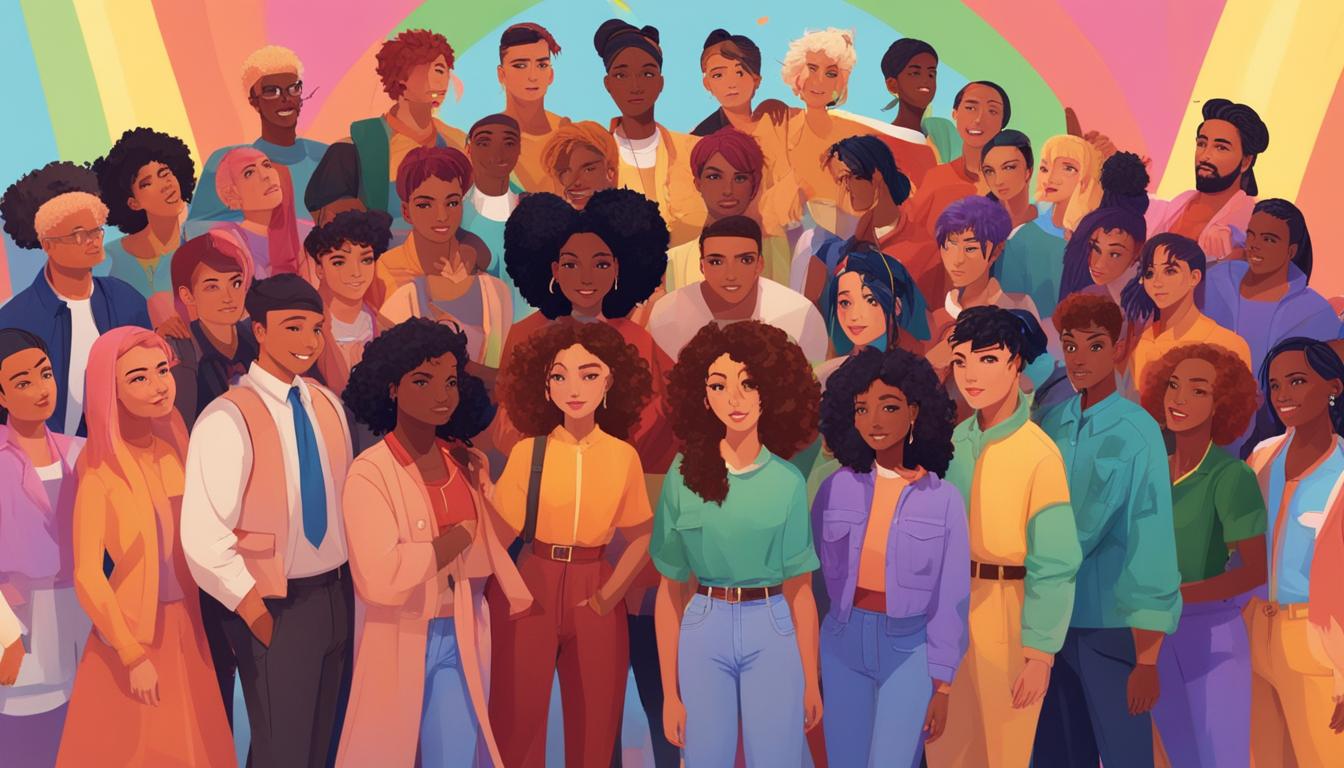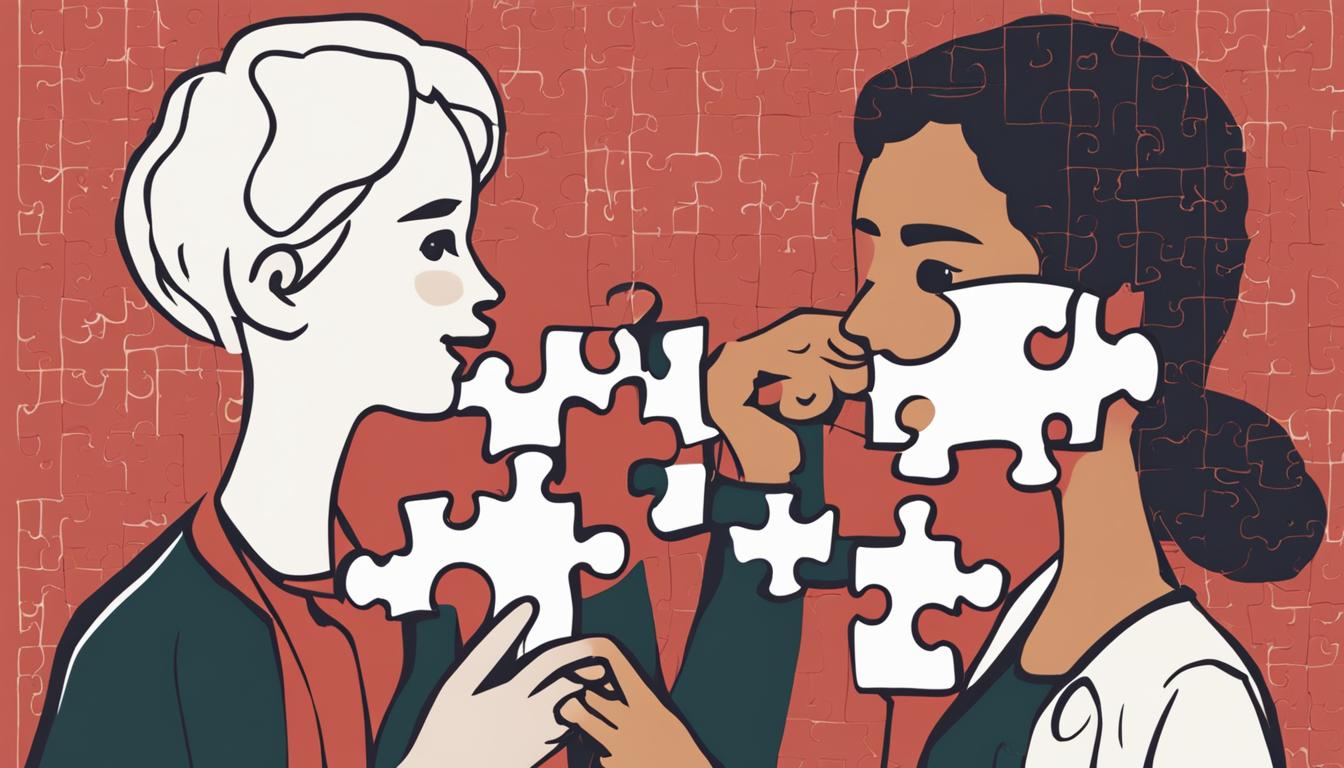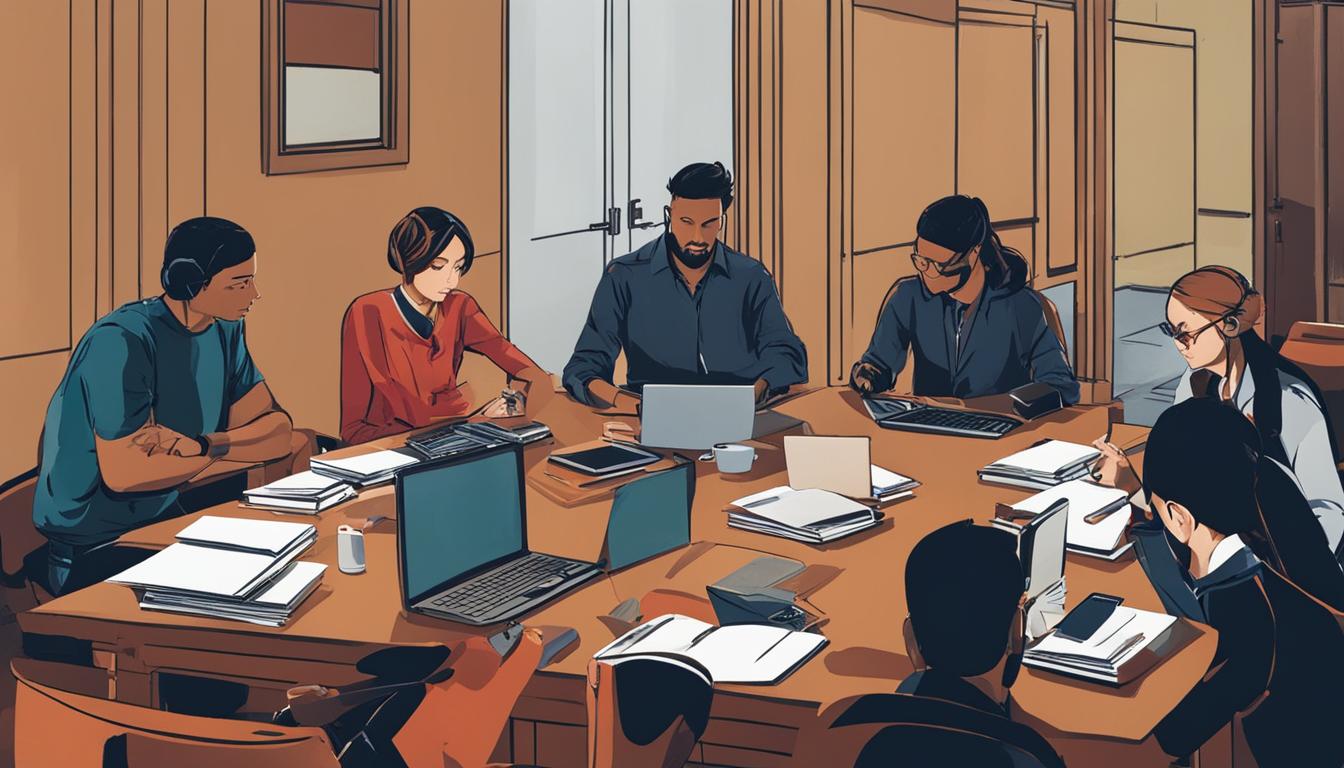Effective communication is a fundamental skill that influences all aspects of our lives, whether it’s in the workplace or building meaningful personal relationships. To excel in effective communication, it’s essential to understand the techniques and strategies that can help you convey your message clearly, connect with others, and foster mutual understanding.
In this article, we will dive into various effective communication skills, including oral and written communication, non-verbal cues, active listening, and tailoring your message to different audiences. By mastering these skills, you’ll be able to enhance your communication effectiveness and build stronger connections with those around you.
Key Takeaways:
- Effective communication is crucial for success in all facets of life.
- Mastering communication techniques helps convey messages clearly and foster understanding.
- Types of communication include oral, written, non-verbal, and contextual.
- Active listening and tailoring messages to the audience are essential skills to develop.
- Online communication requires effective time management and minimizing distractions.
Types of Communication to Develop
Effective communication skills encompass various forms of communication. To become a proficient communicator, it is important to develop the following types of communication:
1. Oral Communication
Oral communication involves expressing thoughts and ideas through speech. It encompasses verbal conversations, presentations, and public speaking. Developing strong oral communication skills allows you to articulate your thoughts clearly and engage with others effectively.
2. Written Communication
Written communication involves conveying information through written words. This includes emails, reports, memos, and other written documents. Enhancing your written communication skills enables you to communicate effectively, convey complex ideas concisely, and tailor your message to specific audiences.
3. Non-Verbal Communication
Non-verbal communication refers to the use of facial expressions, body language, gestures, and eye contact to convey messages. It plays a crucial role in effective communication, as it enhances understanding, establishes rapport, and adds depth to conversations.
4. Active Listening
Active listening involves fully engaging with the speaker and demonstrating attentiveness. It requires focusing on the speaker’s words, observing their non-verbal cues, and empathizing with their perspective. Developing active listening skills helps foster better understanding, strengthens relationships, and promotes effective collaboration.
5. Contextual Communication
Contextual communication involves sharing information with mutual understanding. It requires considering the context, cultural nuances, and the specific needs of the audience. Mastering contextual communication enables you to adapt your message appropriately and ensure effective communication across diverse settings.
To achieve effective communication, it is essential to develop and hone these types of communication. Incorporating these skills into your daily interactions will enable you to convey messages clearly, engage with others, and build strong connections.

What is Effective Communication?
Effective communication is the foundation of successful interactions. It is the ability to clearly inform others while actively listening to their thoughts and opinions. In today’s interconnected world, being able to establish a connection with others is essential.
When practicing effective communication, it is important to express your thoughts and opinions in an inclusive manner, considering the diverse perspectives of your audience. This ensures that everyone feels heard and valued.
Understanding your audience is a key aspect of effective communication. By taking the time to learn about their needs, interests, and preferences, you can tailor your message to resonate with them. This level of understanding helps you deliver information in a way that captures their attention and engages them.
Furthermore, effective communication involves responding to feedback in real-time. Actively listening to others and acknowledging their input fosters a sense of respect and collaboration. By incorporating this feedback into your communication approach, you can continuously improve and strengthen your connection with others.
Practicing effective communication skills is invaluable in both personal and professional settings. It enables you to build stronger relationships, resolve conflicts, and achieve shared goals.

How to Improve Communication Skills
Effective communication is a vital skill that can have a profound impact on your personal and professional life. To enhance your communication abilities, there are several strategies you can employ:
1. Tailor Your Message to the Audience
One key aspect of effective communication is understanding your audience and delivering your message in a way that resonates with them. By considering their needs, preferences, and level of understanding, you can tailor your message to ensure clarity and engagement.
2. Embrace Concise Messaging
Conciseness is crucial in communication. Be mindful of unnecessary jargon, long-winded explanations, or excessive details that can confuse or overwhelm your audience. Aim for clear and concise messaging to convey your thoughts effectively.
3. Choose the Right Medium for Communication
Every communication situation demands a suitable medium. While digital platforms offer convenience, certain messages may be better conveyed through face-to-face interactions. Understanding when to utilize email, phone calls, video conferences, or in-person meetings is essential for successful communication.

4. Be Actively Involved
To improve your communication skills, it’s important to actively participate in conversations. Engage in active listening, ask questions, and provide feedback to demonstrate your involvement and understanding. Actively participating in discussions fosters meaningful exchanges and strengthens relationships.
5. Emphasize Face-to-Face Communication
Although digital communication has become prevalent, face-to-face interactions remain valuable for effective communication. Whenever possible, prioritize in-person meetings to establish rapport, showcase non-verbal cues, and create a stronger connection with others.
By incorporating these strategies into your communication approach, you can enhance your ability to convey ideas, connect with others, and build stronger relationships.
Online Communication Tips
In today’s digital era, online communication has become a vital aspect of our personal and professional lives. Whether you are working remotely or connecting with friends and family, developing effective online communication skills is essential. Here are some valuable tips to enhance your online communication effectiveness:
Sticking to time limits:
When engaged in online conversations, respecting the time of all participants is crucial. Be mindful of the allocated time for meetings or discussions and ensure that your contributions are concise and relevant.
Being mindful of the other person:
Remember that online communication lacks the context of non-verbal cues. Pay attention to the tone and content of your messages, taking into consideration how they may be perceived by the recipient. Practicing empathy and keeping an open mind can help foster better communication.
Recapping important details:
In online conversations, it is easy to miss or forget important points. To avoid misunderstandings and ensure clarity, summarize and recap significant details during the conversation. This will keep everyone on the same page and minimize confusion.
Responding to messages promptly:
One of the advantages of online communication is the ability to connect and respond in a timely manner. Make it a priority to address messages and inquiries promptly, demonstrating your commitment to effective and efficient communication.
Minimizing distractions:
When engaging in online conversations, it is essential to create an environment that minimizes distractions. Find a quiet space, turn off notifications on your devices, and focus on the conversation at hand. This will enable you to give your full attention to the discussion and contribute effectively.
By implementing these tips, you can improve your online communication skills and have more impactful interactions in both professional and personal settings. Remember, effective communication is a continuous process of learning and adapting. Practice these strategies consistently, and you will enhance your ability to connect, collaborate, and build meaningful relationships online.
Extra Tips to Sharpen Communication Skills
Effective communication relies on more than just basic skills. To truly excel, it’s essential to develop certain qualities and practices. By focusing on approachability, patience, self-awareness, checking for understanding, and developing other communicators, you can enhance your communication skills in any situation.
Approachability is a key trait for effective communication. When you are approachable, others feel comfortable reaching out to you with their thoughts and concerns. This fosters open dialogue and promotes collaboration.
Patience is another vital quality. It allows you to listen attentively and respond thoughtfully rather than reacting impulsively. Patience enables you to understand different perspectives and avoid misunderstandings.
Self-awareness plays a crucial role in effective communication. Knowing your communication style, strengths, and areas for improvement allows you to adapt your approach to different situations and individuals. It helps you tailor your message and delivery for maximum impact.
Always prioritize checking for understanding during conversations. Take the time to confirm that your message has been received and interpreted correctly. Encourage questions and provide clear explanations to ensure clarity and prevent miscommunication.
To become a truly skilled communicator, focus not only on your own development but also on developing other communicators. Share your knowledge and experience with colleagues and team members, offering guidance and support to help them enhance their own communication skills.
Active Listening Techniques
Active listening is a crucial aspect of effective communication. It involves fully engaging with the speaker, understanding their perspective, and responding thoughtfully. By actively listening, you can foster deeper connections and strengthen relationships. Here are two techniques that can improve your active listening skills:
Adding Value to the Conversation
When engaging in a conversation, strive to add value by offering meaningful input and insights. This shows that you are actively listening and genuinely interested in the discussion. By contributing valuable thoughts, you not only demonstrate your engagement but also enhance the overall conversation. Remember, adding value doesn’t mean dominating the conversation but rather sharing relevant information that enriches the dialogue.
Paraphrasing Without Judgment
Paraphrasing is an effective technique that shows you understand what the speaker is saying. It involves restating the speaker’s ideas in your own words without adding judgment or interpretation. Paraphrasing allows you to confirm your understanding and provides an opportunity for the speaker to clarify or expand on their thoughts. This technique promotes mutual understanding and reduces the risk of miscommunication.
By incorporating these active listening techniques into your communication repertoire, you can enhance your relationships, improve understanding, and contribute to more effective conversations.

Conclusion
Effective communication is a vital skill that plays a significant role in various aspects of life. By implementing the strategies and tips discussed in this article, you can continuously improve your communication skills and enhance your overall effectiveness in connecting with others. Constantly seeking feedback, whether it’s from colleagues, friends, or family, will provide valuable insights and opportunities for growth.
Practicing empathy and understanding the needs of your audience will ensure that your messages are received and understood in the intended manner. Remember to actively listen to others, paying attention to both verbal and non-verbal cues, and respond accordingly.
Continuous improvement is key. Regularly assess your communication skills and identify areas for development. Engage in self-reflection and be open to learning from your experiences. By actively working on your communication skills, you will become a proficient communicator, capable of fostering meaningful connections and achieving success in all aspects of your life.
Frequently Asked Questions (FAQ)
What is effective communication?
Effective communication involves clear and concise messaging, active listening, and non-verbal communication. It is the ability to make a connection with others and express thoughts and opinions in an inclusive way.
Why is effective communication important?
Effective communication is crucial for success in various aspects of life, including the workplace and personal relationships. It leads to successful and meaningful interactions by understanding and addressing the needs of others.
What are the types of communication to develop?
The types of communication to develop include oral communication (speech), written communication (writing), non-verbal communication (facial expressions and body language), active listening (receiving information), and contextual communication (sharing information with mutual understanding).
How can I improve my communication skills?
To improve communication skills, it is important to tailor the message to the audience, keep it concise and engaging, choose the right medium for communication, be actively involved in the conversation, and use face-to-face communication whenever possible.
What are some online communication tips?
Online communication tips include sticking to time limits, being mindful of the other person, recapping important details, responding to messages, and minimizing distractions to enhance online communication effectiveness.
What are some extra tips to sharpen communication skills?
Extra tips to sharpen communication skills include being approachable, patient, and self-aware, checking for understanding, and developing other communicators in order to strengthen communication skills in any situation.
What are some active listening techniques?
Active listening techniques include adding value to the conversation and paraphrasing without judgment. These techniques can improve active listening skills and enhance overall communication effectiveness.
How can I continuously improve my communication skills?
Continuous improvement of communication skills can be achieved by seeking feedback from others, practicing empathy, and actively working on improving communication techniques and strategies.
Source Links
- https://www.betterup.com/blog/effective-strategies-to-improve-your-communication-skills
- https://www.eseibusinessschool.com/mastering-professional-communication-skills/
- https://www.linkedin.com/pulse/mastering-art-communication-effective-strategies-your-michelitsch


